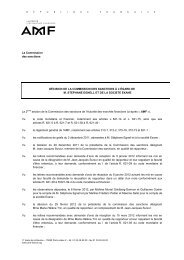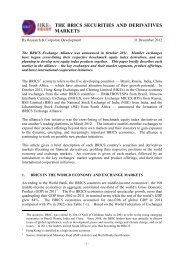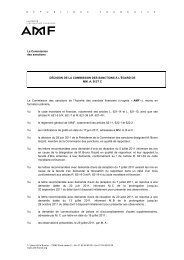Climate change, impacts and vulnerability in Europe ... - MemoFin.fr
Climate change, impacts and vulnerability in Europe ... - MemoFin.fr
Climate change, impacts and vulnerability in Europe ... - MemoFin.fr
Create successful ePaper yourself
Turn your PDF publications into a flip-book with our unique Google optimized e-Paper software.
<strong>Climate</strong> <strong>impacts</strong> on environmental systemsdur<strong>in</strong>g w<strong>in</strong>ter (McNeil <strong>and</strong> Matear, 2008). Ten percent of the Arctic Ocean may become corrosiveto calcium carbonate already by 2020 (Ste<strong>in</strong>acheret al., 2009), <strong>and</strong> surface waters of the Baltic Seawill still become corrosive well before the end ofthe century. In the Black Sea <strong>and</strong> MediterraneanSea there is no danger of surface waters becom<strong>in</strong>gcorrosive to calcium carbonate before 2100, butthey will suffer sharp reductions <strong>in</strong> carbonate ionconcentrations (Med Sea – 37 %; Black Sea – 45 %).These rapid chemical <strong>change</strong>s are an added pressureon mar<strong>in</strong>e calcifiers <strong>and</strong> ecosystems of the <strong>Europe</strong>anseas that are already heavily suffer<strong>in</strong>g <strong>fr</strong>om otheranthropogenic <strong>in</strong>fluences.Without dramatic actions to curb CO 2emissions,recovery <strong>fr</strong>om human-<strong>in</strong>duced acidification willrequire thous<strong>and</strong>s of years for the Earth systemto re-establish roughly similar ocean chemicalconditions (Archer, 2005; Tyrrell et al., 2007; Archer<strong>and</strong> Brovk<strong>in</strong>, 2008) <strong>and</strong> millions of years for coralreefs to return, based on palaeo-records of naturalcoral reef ext<strong>in</strong>ction events (Veron, 2008).3.1.3 Ocean heat contentRelevanceThe World Ocean is the dom<strong>in</strong>ant component of theEarth's heat balance. Oceans cover roughly 72 % ofthe planet's surface, <strong>and</strong> water has a heat uptakecapacity that is around 20 times greater than that ofthe atmosphere (Levitus et al., 2009, 2012). About90 % of the total warm<strong>in</strong>g caused by climate <strong>change</strong>is manifested <strong>in</strong> <strong>in</strong>creased global heat content.Hence, a precise estimate of Ocean Heat Content(OHC) is essential for underst<strong>and</strong><strong>in</strong>g the role ofoceans <strong>in</strong> past climate <strong>change</strong>, <strong>and</strong> for assess<strong>in</strong>gfuture climate <strong>change</strong> (Hansen, 2005; Church et al.,2011; Hansen et al., 2011). OHC is def<strong>in</strong>ed as the<strong>in</strong>tegrated temperature <strong>change</strong> times the densityof sea water, times specific heat capacity <strong>fr</strong>om thesurface down to the deep ocean. Estimates of it aremade based on temperature measurements or onreanalyses made us<strong>in</strong>g a comb<strong>in</strong>ation of models <strong>and</strong>observations (see Section 2.1).Changes <strong>in</strong> heat content also cause the ocean toexp<strong>and</strong> or contract, thereby chang<strong>in</strong>g sea levelregionally <strong>and</strong> globally (Cazenave <strong>and</strong> Llovel,2010). This thermosteric effect has contributedabout one quarter to global sea-level rise s<strong>in</strong>ce 1993(see Section 3.2.2).Past trendsThe warm<strong>in</strong>g of the World Ocean accounts forapproximately 90 % of the warm<strong>in</strong>g of the Earthdur<strong>in</strong>g the last 6 decades (Church et al., 2011;Hansen et al., 2011; Levitus et al., 2012).Figure 3.2 shows that the heat content of the WorldOcean has <strong>in</strong>creased s<strong>in</strong>ce around 1970. The l<strong>in</strong>eartrend over the whole time series 1955–2010 of theuppermost 700 m <strong>and</strong> 2 000 m layer was 0.27 Wm -2<strong>and</strong> 0.39 Wm -2 (per unit area of the World Ocean),respectively. Two thirds of the observed <strong>in</strong>crease ofglobal heat content has occurred <strong>in</strong> the upper 700 mof the ocean, with <strong>in</strong>creases <strong>in</strong> the layers below700 m depth account<strong>in</strong>g for the rema<strong>in</strong><strong>in</strong>g one third(Dore et al., 2009; Levitus et al., 2009, 2012; Purkey<strong>and</strong> Johnson, 2010). Heat content has <strong>in</strong>creased <strong>in</strong> allmajor sea bas<strong>in</strong>s of the World Ocean, <strong>in</strong> particular <strong>in</strong>the Atlantic Ocean (Levitus et al., 2012).Several global ocean data assimilation products areavailable to compare observation-based estimateswith <strong>in</strong>dependent reanalysis data. Global <strong>and</strong>bas<strong>in</strong>‐scale heat content warm<strong>in</strong>g trends <strong>in</strong> theupper 700 m of the ocean computed <strong>fr</strong>om a set ofKey messages: 3.1.3 Ocean heat content• The warm<strong>in</strong>g of the World Ocean accounts for approximately 93 % of the warm<strong>in</strong>g of the Earth systemdur<strong>in</strong>g the last 6 decades.• An <strong>in</strong>creas<strong>in</strong>g trend <strong>in</strong> the heat content <strong>in</strong> the uppermost 700 m depth of the World Ocean is evidentover the last 6 decades. Recent observations show substantial warm<strong>in</strong>g also of the deeper ocean(between 700 m <strong>and</strong> 2 000 m depth).• Further warm<strong>in</strong>g of the oceans is expected with projected climate <strong>change</strong>, but quantitative projectionsof ocean heat content are not available.92 <strong>Climate</strong> <strong>change</strong>, <strong>impacts</strong> <strong>and</strong> <strong>vulnerability</strong> <strong>in</strong> <strong>Europe</strong> 2012
















